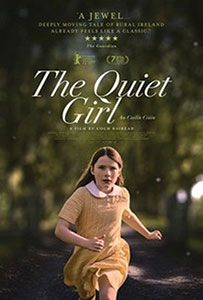‘The Quiet Girl’ – Irish Film at its Absolute Best
Opinion Advocates for ideas and draws conclusions based on the author/producer’s interpretation of facts and data.
 By Brian McGowan
By Brian McGowan
My wife and I had the pleasure last Saturday of viewing “The Quiet Girl” (in Irish An Cailín Ciúin) at Pleasantville’s Jacob Burns Film Center, where it opened for a Westchester exclusive showing.
Directed by Colm Bairéad, and released last year, it is the director’s narrative feature film debut, and was Ireland’s official entry for Best International Feature Film for the Academy Awards.
Superb performances abound in this highest-grossing Irish-language film of all time. Especially so is the mesmerizing performance delivered by then-12-year-old Dubliner Catherine Clinch who portrays nine-year-old Cáit. This is her first role, and hers is a name to remember.
Set in rural Ireland in 1981, Cáit survives in a sort of shadow world, facing multiple difficulties at school and at home. Her alcoholic father, “Da,” (Michael Patric) rules his roost with utter disregard for the welfare of his wife and children, neglecting them equally while he lets his farm sink to near-ruin.
When her mother, “Mam” (Kate Nic Chonaonnaigh) enters the final months of a difficult pregnancy, Cáit is sent to live with her mother’s cousin, Eibhlín Kinsella (Carrie Crowley) and husband Seán Kinsella (Andrew Bennett). They are a hard-working, apparently childless farming couple in County Waterford, a three-hour drive distant from Cáit’s home.
The environment that Cáit finds under their care is starkly different than that which she has left behind. The film brilliantly contrasts both settings, in part by using different tones of light. The Kinsellas’ house is warm, well-tended and inviting. Their farm is well-kept and efficiently run. The home Cáit has left behind is dark, ill-kept and crowded. Her father’s farm is a shambles of what it should be, and he cannot even manage to get the hay cut in time.
Eibhlín instantly takes to Cáit, and shows the girl all the kindness of a mother. Seán, however, keeps his distance, and we at first wonder does he have a heart of stone? Slowly, however, a kinder side of him is revealed. He tells Cáit early on that there are no secrets in their house, yet subtle hints soon surface that secrets are no stranger to the Kinsella abode.
In one of many memorable scenes, Cáit wanders off while accompanying Seán about the farm. He frantically looks for her when he realizes she has gone off, fear written across his face. When he comes upon her innocently bringing a broom to help him sweep muck out of the milking shed, he scolds her severely, almost excessively so. His anger, we will learn, is justified. And the small cookie he slips her afterwards reminds us that this is a good man, struggling to do the right thing, and a far-better father figure to Cáit than is her own father.
Slowly, Cáit and Seán come around to each other. He parts with hard-earned cash to buy her some dresses and other clothes, envisioning perhaps a longer stay with them. Both open more and more to each other, and Cáit seems to fill a deep emotional void in the couple’s lives.
Their painful truth will be unveiled, and all our questions, save one, will be answered. The emotional ending in the last few seconds of the film will leave the viewer yearning for an answer to that one question.
Based on the novella “Foster,” by Claire Keegan, “The Quiet Girl” is 95 minutes long. It was produced in Ireland by Cleona Ní Chrualaoi. Most of the dialogue is in Irish, with English subtitles.
It has won numerous film festival awards, including the Berlin, Newport Beach and Dallas International festivals. The acting is outstanding, with stellar performances, particularly Clinch, Crowley and Bennett. Kate McCullough’s cinematography is equally brilliant. Stephen Rennicks composed the score, which includes a haunting vocal performance of a classic Irish song, “An Páistínn Fionn,” which translates to “The Little Fair Child.” And that is what Cáit is the embodiment of.
Do not miss this film, currently playing at the Jacob Burns through Mar. 16.
Longtime Pleasantville resident Brian McGowan was born and raised in the Bronx and is a second-, third- and fifth-generation Irish-American/Canadian, as his immigrant ancestors followed several paths to the New World. Reach him at brian.m.mcgowan1952@gmail.com. He is the author of two books, “Thunder at Noon,” about the Battle of Waterloo, and “Love, Son John,” about World War II. Both are available at Amazon.com.

Examiner Media – Keeping you informed with professionally-reported local news, features, and sports coverage.
